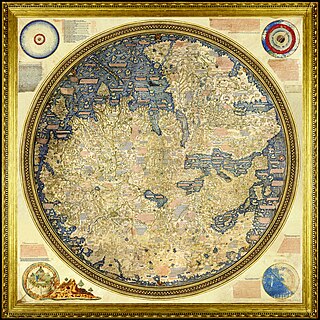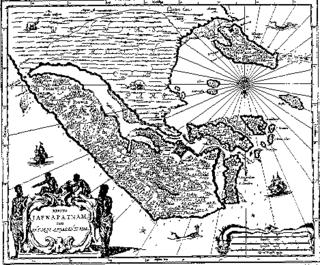Related Research Articles

A colony is a territory subject to a form of foreign rule, which rules the territory and its indigenous peoples separated from the foreign rulers, the colonizer, and their metropole. This separated rule was often organized into colonial empires, with their metropoles at their centers, making colonies neither annexed or even integrated territories, nor client states. Particularly new imperialism and its colonialism advanced this separated rule and its lasting coloniality. Colonies were most often set up and colonized for exploitation and possibly settlement by colonists.

Dom Henrique of Portugal, Duke of Viseu, better known as Prince Henry the Navigator, was a central figure in the early days of the Portuguese Empire and in the 15th-century European maritime discoveries and maritime expansion. Through his administrative direction, he is regarded as the main initiator of what would be known as the Age of Discovery. Henry was the fourth child of King John I of Portugal, who founded the House of Aviz.

The 16th century began with the Julian year 1501 and ended with either the Julian or the Gregorian year 1600 (MDC), depending on the reckoning used.

The history of the Kingdom of Portugal from the Illustrious Generation of the early 15th century to the fall of the House of Aviz in the late 16th century has been named the "Portuguese golden age" and the "Portuguese Renaissance". During this period, Portugal was the first European power to begin building a colonial empire as during the Age of Exploration Portuguese sailors and explorers discovered an eastern route to India as well as several Atlantic archipelagos and colonized the African coast and Brazil. They also explored the Indian Ocean and established trading routes throughout most of southern Asia, sending the first direct European maritime trade and diplomatic missions to Ming China and to Japan, at the same time installing trading posts and the most important colony: Portuguese Macau. The Portuguese Renaissance produced a plethora of poets, historians, critics, theologians, and moralists. The Cancioneiro Geral by Garcia de Resende is taken to mark the transition from Old Portuguese to the modern Portuguese language.

The Treaty of Tordesillas, signed in Tordesillas, Spain, on 7 June 1494, and ratified in Setúbal, Portugal, divided the newly discovered lands outside Europe between the Kingdom of Portugal and the Crown of Castile, along a meridian 600 kilometres (370 mi) west of the Cape Verde islands, off the west coast of Africa. That line of demarcation was about halfway between Cape Verde and the islands visited by Christopher Columbus on his first voyage, named in the treaty as Cipangu and Antillia.

Funchal is the capital, largest city and the municipal seat of Portugal's Autonomous Region of Madeira, bordered by the Atlantic Ocean. The city has a population of 105,795, making it the sixth largest city in Portugal. Because of its high cultural and historical value, Funchal is one of Portugal's main tourist attractions; it is also popular as a destination for New Year's Eve, and it is the leading Portuguese port on cruise liner dockings.

Conquistadors or conquistadores is the term used to refer to Spanish and Portuguese soldiers and explorers who carried out the conquests and explorations of the Age of Discovery. Conquistadors sailed beyond the Iberian Peninsula to the Americas, Oceania, Africa and Asia, establishing new colonies and trade routes. They brought much of the "New World" under the dominion of Spain and Portugal.

São Luís is the capital and largest city of the Brazilian state of Maranhão. The city is located on Upaon-açu Island or Ilha de São Luís, in the Baía de São Marcos, an extension of the Atlantic Ocean which forms the estuary of Pindaré, Mearim, Itapecuru and other rivers. Its coordinates are 2.53° south, 44.30° west. São Luís has the second largest maritime extension within Brazilian states. Its maritime extension is 640 km. The city proper has a population of some 1,037,775 people. The metropolitan area totals 1,536,017, ranked as the 15th largest in Brazil.

The Catholic Monarchs were Queen Isabella I of Castile and King Ferdinand II of Aragon, whose marriage and joint rule marked the de facto unification of Spain. They were both from the House of Trastámara and were second cousins, being both descended from John I of Castile; to remove the obstacle that this consanguinity would otherwise have posed to their marriage under canon law, they were given a papal dispensation by Sixtus IV. They married on October 19, 1469, in the city of Valladolid; Isabella was 18 years old and Ferdinand a year younger. Most scholars generally accept that the unification of Spain can essentially be traced back to the marriage of Ferdinand and Isabella. Their reign was called by W.H. Prescott "the most glorious epoch in the annals of Spain".

Faro is a municipality, the southernmost city and capital of the district of the same name, in the Algarve region of southern Portugal. With an estimated population of 67,566 inhabitants in 2021, the municipality covers an area of about 202.57 km2 (78.21 sq mi).
The municipalities of Faro-Olhão-Loulé due to its adjacency, sharing of infrastructures and regular commute can be considered an intermunicipal community with a population of 184,578 inhabitants (2021). A Metro connecting this community is planned to be finished by 2029.

The Age of Discovery, also known as the Age of Exploration, was part of the early modern period and largely overlapped with the Age of Sail. It was a period from approximately the late 15th century to the 17th century, during which seafarers from a number of European countries explored, colonized, and conquered regions across the globe. The Age of Discovery was a transformative period in world history when previously isolated parts of the world became connected to form the world-system and laid the groundwork for globalization. The extensive overseas exploration, particularly the opening of maritime routes to the Indies and the European colonization of the Americas by the Spanish and Portuguese, later joined by the English, French and Dutch, spurred in the international global trade. The interconnected global economy of the 21st century has its origins in the expansion of trade networks during this era.

Faial Island, also known as Fayal Island, is a Portuguese island of the Central Group or Grupo Central of the Azores, in the Atlantic Ocean.

Inter caetera was a papal bull issued by Pope Alexander VI on the 4 May 1493, which granted to the Catholic Monarchs King Ferdinand II of Aragon and Queen Isabella I of Castile all lands to the "west and south" of a pole-to-pole line 100 leagues west and south of any of the islands of the Azores or the Cape Verde islands.
Fernão de Loronha, whose name is often corrupted to Fernando de Noronha or Fernando della Rogna, was a prominent 16th-century Portuguese merchant of Lisbon, of Jewish descent. He was the first charter-holder (1502–1512), the first donatary captain in Brazil and sponsor of numerous early Portuguese overseas expeditions. The islands of Fernando de Noronha off the coast of Brazil, discovered by one of his expeditions and granted to Loronha and his heirs as a fief in 1504, are named after him.

The geography of North Africa has been reasonably well known among Europeans since classical antiquity in Greco-Roman geography. Northwest Africa was known as either Libya or Africa, while Egypt was considered part of Asia.

This is a chronology of the early European exploration of Asia.

The Catholic Church during the Age of Discovery inaugurated a major effort to spread Christianity in the New World and to convert the indigenous peoples of the Americas and other indigenous peoples. The evangelical effort was a major part of, and a justification for, the military conquests of European powers such as Portugal, Spain, and France. Christian missions to the indigenous peoples ran hand-in-hand with the colonial efforts of Catholic nations. In the Americas and other colonies in Asia, and Africa, most missions were run by religious orders such as the Franciscans, Dominicans, Augustinians, and Jesuits. In Mexico, the early systematic evangelization by mendicants came to be known as the "Spiritual Conquest of Mexico".
The first wave of European colonization began with Spanish and Portuguese conquests and explorations, and primarily involved the European colonization of the Americas, though it also included the establishment of European colonies in India and in Maritime Southeast Asia. During this period, European interests in Africa primarily focused on the establishment of trading posts there, particularly for the African slave trade. The wave ended with the British annexation of the Kingdom of Kandy in 1815 and the founding of the colony of Singapore in 1819.

Portuguese maritime exploration resulted in the numerous territories and maritime routes recorded by the Portuguese as a result of their intensive maritime journeys during the 15th and 16th centuries. Portuguese sailors were at the vanguard of European exploration, chronicling and mapping the coasts of Africa and Asia, then known as the East Indies, and Canada and Brazil, in what came to be known as the Age of Discovery.

The Portuguese conquest of the Jaffna kingdom occurred after Portuguese traders arrived at the rival Kotte kingdom in the southwest of modern Sri Lanka in 1505. Many kings of Jaffna, such as Cankili I, initially confronted the Portuguese in their attempts at converting the locals to Roman Catholicism, but eventually made peace with them.
References
- 1 2 3 Grun, Bernard (1991). The Timetables of History (3rd ed.). New York: Simon & Schuster. p. 229. ISBN 0-671-74919-6.